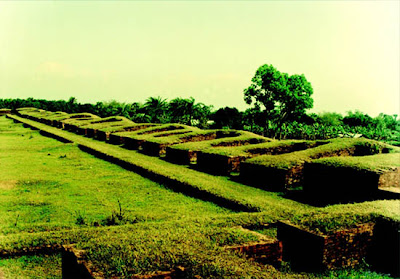
PM talks option for open pit
But says rehabilitation to be done first
Prime Minister Sheikh Hasina has said Barapukuria coal mine might be converted into the country's first open pit mine after completely rehabilitating the local people affected by the on-going underground mining activities.
The PM said this while discussing with officials at the power ministry how to address the perennial power and energy crises. She mainly focused on the progress of power projects during the nearly four-hour meeting on Wednesday.
Meeting sources said the premier ruled out mining at Phulbari now or in the near future on political considerations.
“At one stage of the discussion, the prime minister mentioned that the land in Barapukuria mining area is already damaged and has subsided. After paying compensation to people for the loss of land and rehabilitating them, the mine could be converted into an open pit mine,” one source said.
She noted that while many countries could easily implement open pit mining to extract up to 90 percent of their coal deposits, a densely populated agriculture-based country like Bangladesh could not go for such mining method so easily.
Officials say underground mining allows extraction of up to 20 percent of the deposits.
Barapukuria mine has a deposit of 389 million tonnes of coal. But the present underground mining design would allow extraction of only 30 million tonnes over a period of 30 years, and leave a 4.5-square kilometre area at least one to two metres subsided and of no use, they say.
Sheikh Hasina discussed how open pit mining could be implemented minimising its negative impact on environment. She also inquired whether dust caused by open pit mining would pose a very serious problem.
She felt that at first people have to be compensated for loss of land, and then they could realise that a bigger mine has greater benefit for the whole nation.
The premier and officials present at the meeting had the same view on coal mining method.
Officials told the PM that one of the biggest environmental issues of open pit mining was managing the sub-soil water reservoir. If it is nit managed, it can dry up all water sources in the adjacent areas, affecting agriculture and forestry.
Upon completion of such an open pit mine, there would a void in the land that could be converted into a lake to serve as a long-term water source for irrigation and fisheries.
The PM also discussed how to augment natural gas supplies to minimise the on-going gas crunch and emphasised setting up two compressor stations to boost gas supplies across the country by 2012.
She also suggested that the authorities discourage use of Compressed Natural Gas (CNG) and increase of CNG price in the present context.
The mine has already created resentment among people of 15 adjacent villages, who were not made aware of the subsidence problem, and were never offered compensation for their loss of land or home. In fact, the project, approved in the early nineties, did not have any provision for such compensation or any component to handle environmental issues.
Soon after assuming power, the Awami League government started working on a compensation package. The government is also planning and designing a mining city in Barapukuria where the affected people will be offered jobs and residential facilities.
Surveys by the Geological Survey of Bangladesh (GSB) and others have so far pinpointed five coal deposits having more than 2,500 million tonnes reserve, which is equivalent to more than 60 tcf (trillion cubic feet) gas. Besides, there are untapped coal resource potentials in the northern region of the country.
But the biggest one of these deposits in Jamalganj is so deep that it cannot be profitably mined with the existing technology. Of the remaining four, only Barapukuria and Phulbari can be developed as open pit mines because the deposits are closer to the surface.
Officials say open pit mining is an attractive option to ensure energy security of the country as it allows maximum extraction of coal. The other method that allows mining of up to 20 percent of deposits is considered by many people as “environment friendly”. But officials say underground mining is actually not environment friendly as the surface land subsides by one to two metres, making it useless for farming.
Bangladesh needs 13 million tonnes of coal a year for the next 10 years to generate additional power to meet its rising demand, as natural gas supplies for generating power will not meet this need.
According to the sixth draft coal policy, if Bangladesh's GDP remains as low as 5.5 percent till 2025, the country needs 19,000 megawatt additional power, if GDP is as high as 8 percent, it needs 41,000 MW power. But the country is already faced with an acute gas crisis. So, coal is being considered as an alternative. In a low GDP growth situation, the country will need 136 million tonnes of coal, and in case of a high GDP growth, it will need 450 tonnes of coal till 2025.
Officials mentioned that the government has already taken initiatives for six 500 MW coal-based power plants in Chittagong, Mongla, Jajira and Meghnaghat. As planned, these plants would operate with imported coal. If an open pit mine is developed in the country, it can cater to the needs of these plants, they added.



























